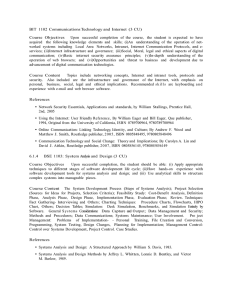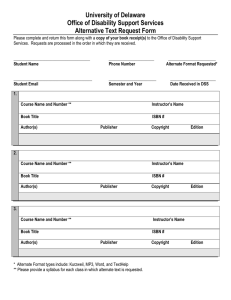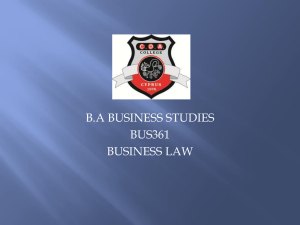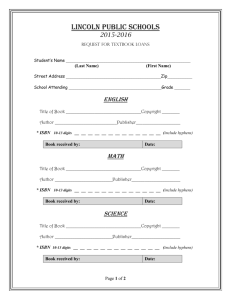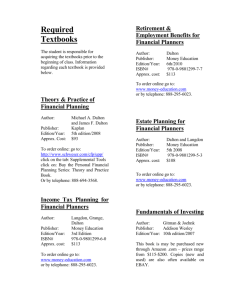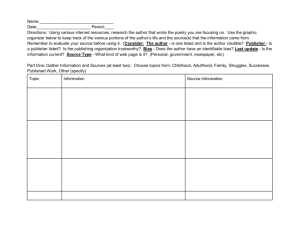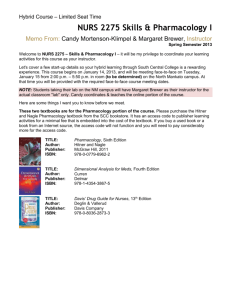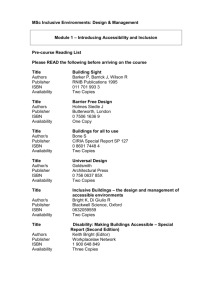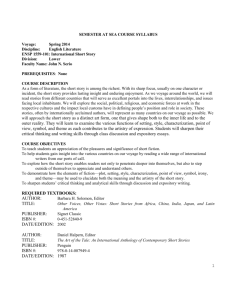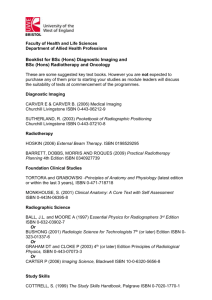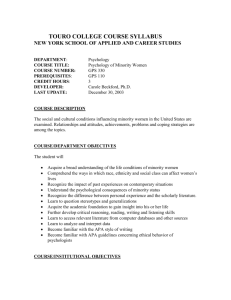University of Kent at Canterbury
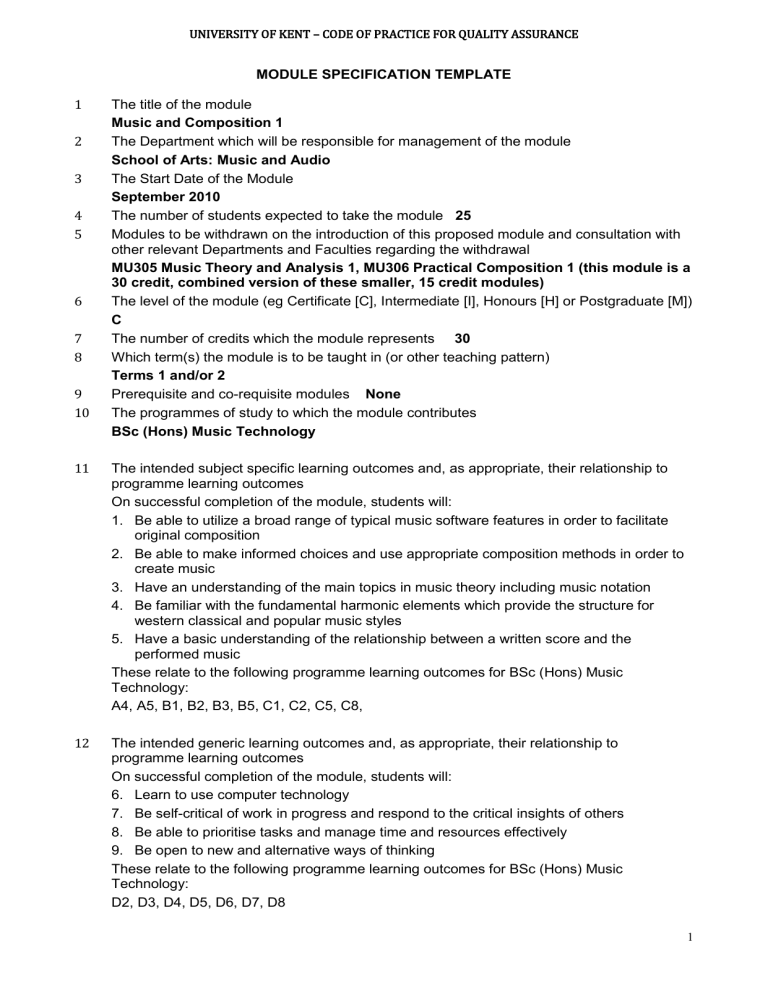
UNIVERSITY OF KENT – CODE OF PRACTICE FOR QUALITY ASSURANCE
1 The title of the module
MODULE SPECIFICATION TEMPLATE
Music and Composition 1
2 The Department which will be responsible for management of the module
School of Arts: Music and Audio
3 The Start Date of the Module
September 2010
4 The number of students expected to take the module 25
5 Modules to be withdrawn on the introduction of this proposed module and consultation with other relevant Departments and Faculties regarding the withdrawal
MU305 Music Theory and Analysis 1, MU306 Practical Composition 1 (this module is a
30 credit, combined version of these smaller, 15 credit modules)
6 The level of the module (eg Certificate [C], Intermediate [I], Honours [H] or Postgraduate [M])
C
7 The number of credits which the module represents 30
8 Which term(s) the module is to be taught in (or other teaching pattern)
Terms 1 and/or 2
9 Prerequisite and co-requisite modules None
10 The programmes of study to which the module contributes
BSc (Hons) Music Technology
11 The intended subject specific learning outcomes and, as appropriate, their relationship to programme learning outcomes
On successful completion of the module, students will:
1. Be able to utilize a broad range of typical music software features in order to facilitate original composition
2. Be able to make informed choices and use appropriate composition methods in order to create music
3. Have an understanding of the main topics in music theory including music notation
4. Be familiar with the fundamental harmonic elements which provide the structure for western classical and popular music styles
5. Have a basic understanding of the relationship between a written score and the performed music
These relate to the following programme learning outcomes for BSc (Hons) Music
Technology:
A4, A5, B1, B2, B3, B5, C1, C2, C5, C8,
12 The intended generic learning outcomes and, as appropriate, their relationship to programme learning outcomes
On successful completion of the module, students will:
6. Learn to use computer technology
7. Be self-critical of work in progress and respond to the critical insights of others
8. Be able to prioritise tasks and manage time and resources effectively
9. Be open to new and alternative ways of thinking
These relate to the following programme learning outcomes for BSc (Hons) Music
Technology:
D2, D3, D4, D5, D6, D7, D8
1
UNIVERSITY OF KENT – CODE OF PRACTICE FOR QUALITY ASSURANCE
13 A synopsis of the curriculum
This module will include the following subject areas:
Basic music notation and conventions. Time signatures and rhythm. Pitch, chords and scales. Cadences and common harmonic patterns. Transposition and transposing instruments. Basic development of aural skills. Examples to illustrate standard Western harmonic practice will be drawn from a wide range of musical eras and styles. Twentiethcentury developments in compositional techniques will also be explored.
14 Indicative Reading List
The AB Guide to Music Theory Vol 1
Eric Taylor
Publisher: Associated Board of the Royal School of Music (July 1989)
ISBN: 1854724460
The AB Guide to Music Theory Vol 2
Eric Taylor
Publisher: Associated Board of the Royal School of Music (January 1991)
ISBN: 1854724479
Music: A Very Short Introduction (Very Short Introduction S.)
Nicholas Cook
Publisher: Oxford Paperbacks, (January 2000)
ISBN: 0192853821
Harmony and Theory: A Comprehensive Source for All Musicians
Keith Wyatt
Publisher: Hal Leonard Corporation, (June 1998)
ISBN: 0793579910
Music Notation: A Manual of Modern Practice (Crescendo Book)
Gardner Read
Publisher: SOS Free Stock, (May 1979)
ISBN: 0800854535
Techniques of the Contemporary Composer
David Cope
Publisher: Wadsworth, (August 1997)
ISBN: 0028647378
15 Learning and Teaching Methods, including the nature and number of contact hours and the total study hours which will be expected of students, and how these relate to achievement of the intended learning outcomes
Delivery of this module is by lectures, demonstrations and practical workshops. The total workload is 300 hours including approximately 2 hours staff contact time per week over two terms. In addition to this, students are encouraged to participate in extra-curricular musicmaking to foster their musical and creative skills.
16 Assessment methods and how these relate to testing achievement of the intended learning outcomes
1. 30% Theory paper 1 (learning outcomes 2, 3, 4, 8)
2
UNIVERSITY OF KENT – CODE OF PRACTICE FOR QUALITY ASSURANCE
2. 30%
3. 40%
5, 6, 7, 8, 9)
Theory paper 2 (learning outcomes 2, 3, 4, 5, 6, 7, 8)
Composition inc. evaluation of 500 words (learning outcomes 1, 2, 3,
17 Implications for learning resources, including staff, library, IT and space
There are no additional implications for learning resources, staff, library, and IT beyond those which are currently maintained.
18 A statement confirming that, as far as can be reasonably anticipated, the curriculum, learning and teaching methods and forms of assessment do not present any non-justifiable disadvantage to students with disabilities
As far as is reasonably practicable and foreseeable, the curriculum, learning and teaching methods and forms of assessment do not present any non-justifiable disadvantage to students with disabilities
Statement by the Director of Learning and Teaching: "I confirm I have been consulted on the above module proposal and have given advice on the correct procedures and required content of module proposals"
................................................................
Director of Learning and Teaching
..............................................
Date
Statement by the Head of Department: "I confirm that the Department has approved the introduction of the module and will be responsible for its resourcing"
.................................................................
Head of Department
New Module July 2010. Dr Paul Fretwell.
..............................................
Date
3

